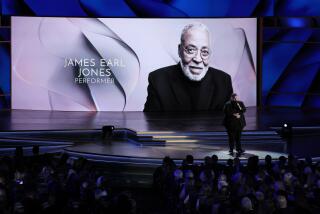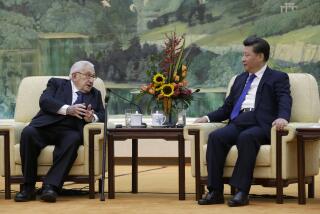2,000 Attend Memorial for CBS’ William Paley : Television: Politicians, journalists, actors and statesmen hear tributes to the powerful ‘Tiffany Network’s’ builder.
- Share via
NEW YORK — Former President Richard Nixon took a seat next to John V. Lindsay, the former liberal Republican mayor of New York City. Watergate reporter Carl Bernstein sat across the synagogue. The boutonniered ushers included Time Warner Chairman Steve Ross and fashion designer Oscar de la Renta.
About 2,000 people filled Temple Emanu-El here on Monday for a memorial service to CBS patriarch William S. Paley. The powerful sat next to the public--Dan Rather and Alan Alda listening to eulogies by Henry Kissinger, David Rockefeller and Walter Cronkite. The range of Paley’s interests--in art, architecture and, most of all, the speakers said, in CBS--were reflected in the service.
“He was a master builder, and CBS was his monument,” former CBS President Frank Stanton said of Paley, who died at age 89 two weeks ago. Paley, the son of a cigar manufacturer, had bought a group of radio stations in 1928 and, as chairman of CBS, built it into the “Tiffany Network,” the most powerful communications empire of its day.
Paley, Stanton said, had a canny knack for highlighting the high art in a TV schedule that included “The Beverly Hillbillies” as well as “MASH” and the New York Philharmonic. “To Bill, the best didn’t always mean highbrow,” Stanton said. “He defended the public’s right to be both entertained and informed. If the public demanded comedy, he wanted it to be the funniest.”
Cronkite, the former CBS anchor, credited Paley with giving resources to build CBS News and ensuring its integrity, despite pressure from his friends in business, government and the arts. “He had no background or training in the gathering and dissemination of news,” Cronkite, a member of CBS’ board of directors, noted, “but somehow he understood that broadcasting had a greater responsibility than profit, and news is the cornerstone of that.
“I am unabashed and unashamed in my admiration for Bill Paley.”
The most surprisingly sentimental speaker at the Fifth Avenue synagogue was Henry Kissinger. It was, after all, during the Nixon Adminstration’s Watergate scandal, when Kissinger was secretary of state, that CBS and the White House were most at odds.
Kissinger, now also a member of CBS’ board, related that he had become friends with Paley when Paley was in his 70s and that the two had traveled around the world, with Paley’s longtime valet in attendance. The last time he saw Paley, shortly before his death, Kissinger recounted, “I found him dozing in a chair, his body quite spent. But, at the sound of a visitor, he woke up with a smile that lit his face and said, ‘Tell me something amusing.’ ”
Paley surrounded himself with a glittering circle, entertaining famous writers and artists as house guests, collecting modern art and eating several gourmet meals a day. His second wife, “Babe” Paley, installed a special kitchen in their Long Island home where Paley would make scrambled eggs for guests at midnight. “His appetite in all its forms was voracious,” Marietta Tree, a CBS board member and family friend, said.
With such a life, as Paley’s son William C. Paley said at the end of the service, even the children of television’s pioneer programmer often found themselves with TV as their baby-sitter. The younger Paley said that he cherished making a meal of knackwurst with his father in his special kitchen and that he thought of his father as like the illustration from the Paley-bankrolled Broadway musical, “My Fair Lady,” which showed the author of the original play, George Bernard Shaw, as a puppet master, pulling the strings while his creation danced below. “My father was television to me,” said Paley. “His medium nurtured me, as it nurtured America.”
In a new, 782-page biography of Paley, author Sally Bedell Smith, while noting Paley’s genius and energy, writes that Paley was a complex man who had a need to diminish the efforts of others in the creation of CBS. Before the memorial service began, two businessmen who found themselves seated together in one row whispered about the critically praised book, which one was reading and the other had heard about in New York media circles. But, although some of the speakers would note some of Paley’s flaws, that was not the subject of the day.
More to Read
The biggest entertainment stories
Get our big stories about Hollywood, film, television, music, arts, culture and more right in your inbox as soon as they publish.
You may occasionally receive promotional content from the Los Angeles Times.










